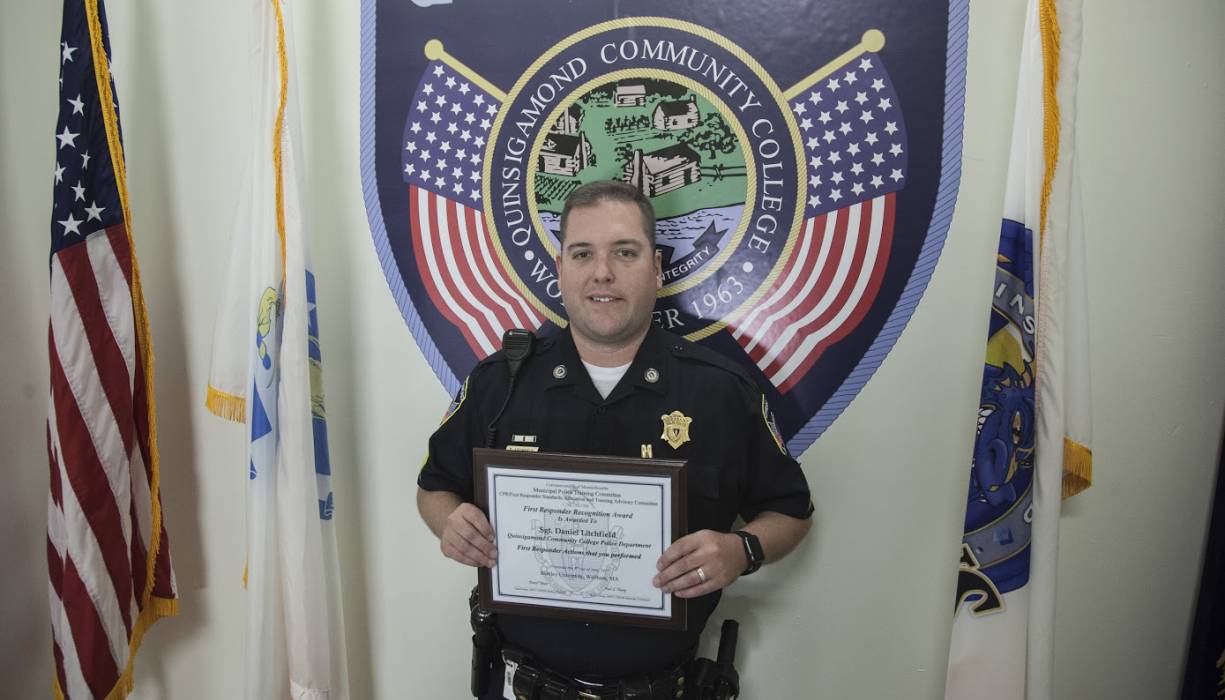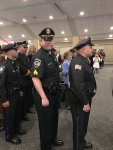You are here
QCC Sergeant Honored for His Heroic Efforts
In early June, Quinsigamond Community College Sergeant Daniel “Dan” Litchfield received the First Responder Recognition Award from The Commonwealth of Massachusetts Municipal Police Training Committee (MPTC). Close to 100 police officers from across the Commonwealth received the award during a ceremony held at Bentley University in Waltham, Mass. These officers were recognized for the actions they performed saving a life or preventing a death within the last year. Sgt. Litchfield, an 11-year veteran of the QCC campus police, was nominated by fellow officer Catherine Dixon after an incident that happened last summer.
According to Sgt. Litchfield, he was working his 3 p.m. – 11 p.m. shift when he decided to stop by the gas station next to the college.
“I pulled into a spot and to my right there was a young woman in a car who appeared to be convulsing,” he said.
Initially thinking the young woman may have been overdosing, he walked over to her car and opened the door.
“She couldn’t speak and her eyes were rolling back, but it did not seem like a typical overdose,” Sgt. Litchfield continued.
Sgt. Litchfield noticed a bottle of soda in the car with the cap off. The young woman appeared to be trying to reach for it unsuccessfully. Finally she was able tell Sgt. Litchfield that she was a diabetic and that she had low blood sugar. Quickly the officer gave her small sips of the soda and called for back-up. A finger prick test showed her sugar was extremely low, even after she had drunk about half the bottle of soda.
Officer Todd LaBranche responded to the call and the two officers were able to help the young woman take two glucose tablets, which help to raise her blood sugar quickly.
“After she took them she was completely back, within about 30 seconds. It was like nothing happened,” Sgt Litchfield said.
The woman told the officers she felt her blood sugar was low but it happened so fast she couldn’t move or control herself. She acknowledged this had happened before, however, once an ambulance arrived she felt well enough and refused treatment.
Hypoglycemia (low blood glucose) is a condition that happens when a person’s blood sugar gets abnormally low. It is also referred to as an insulin reaction or insulin shock. According to the American Diabetes Association, signs and symptoms can happen quickly. Severe hypoglycemia left untreated may even cause coma or even death. The best way to know whether hypoglycemia is occurring is to check a person’s blood sugar.
Signs and symptoms hypoglycemia of include:
- Nervousness or anxiety
- Sweating, chills and clamminess
- Irritability or impatience
- Confusion, including delirium
- Rapid/fast heartbeat
- Lightheadedness or dizziness
- Hunger and nausea
- Blurred/impaired vision
- Tingling or numbness in the lips or tongue
- Headaches
- Weakness or fatigue
- Anger, stubbornness, or sadness
- Lack of coordination
- Nightmares or crying out during sleep
“All of our police officers training includes CPR and First Responder Certifications,” said QCC Police Chief, Kevin Ritacco, adding, “Sgt. Litchfield is a very conscientious officer.”
“In the 11 years I’ve worked here I’ve never seen anything like this before. It’s not something they teach you in the academy,” Sgt Litchfield said. “I was in the right place at the right time.”


